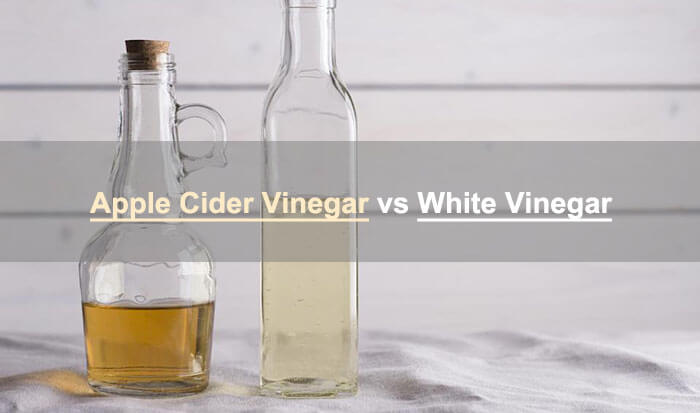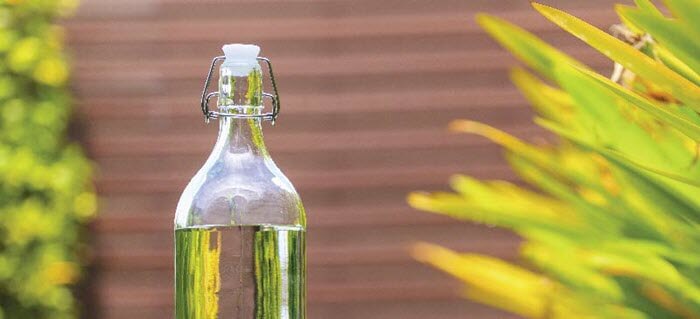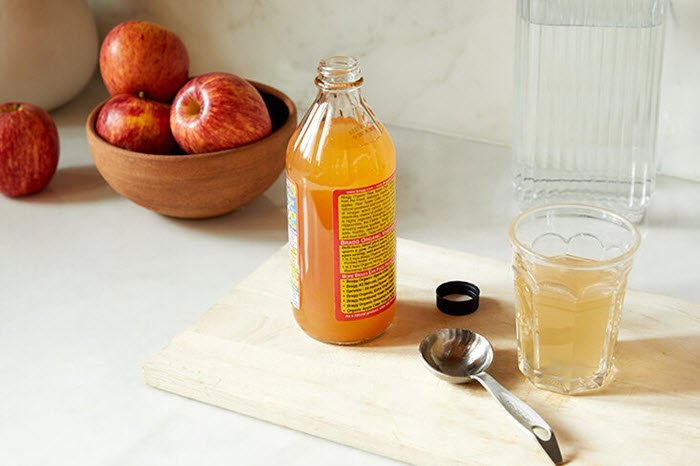Vinegar is ubiquitous in home kitchens around the world. The primary type of vinegar in most kitchens is either white vinegar or apple cider vinegar.
Both types are often used in various recipes, like homemade salad dressings and loaves of bread. Vinegar incorporates a distinct sour-yet-sweet quality to many dishes, elevating taste and balancing flavors.
In addition to cooking, vinegar offers other uses such as medicinal benefits or as an agent for thoroughly cleaning your home.
To understand white vinegar vs apple cider vinegar best, compare and note each type of vinegar’s particular use.
Table Of Contents
What Are White Vinegar and Apple Cider Vinegar?
Multiple types of vinegar exist, and all are similarly processed. Some of the different types of vinegar include:
- Apple cider vinegar
- White vinegar
- Malt vinegar
- Cane vinegar
Vinegar is produced through fermentation and develops acetic acid, which is similar to citric acid.
The most common types of vinegar are apple cider and white vinegar.
Apple cider vinegar has become more popular recently since news of its various health benefits has spread.
Similarly, more people use white vinegar to clean “life hacks,” as demonstrated on social media platforms.
What is White Vinegar
White vinegar is most recognizable by its distinct color. It contains between four and seven percent acetic acid combined with water, and its fermentation process uses grain alcohol as a base.
White vinegar smells and tastes intensely sour, and it is perfect for pickling vegetables and baking. Notably, it is also excellent for cleaning and disinfecting chores.
For many, white vinegar might bring back nostalgic memories of dying Easter eggs or pickling cucumbers. Many chefs and home cooks alike consider white vinegar a miracle ingredient for its versatility.
White vinegar has a sharp taste, so when using it as a cooking ingredient, be less heavy-handed than with other kinds of vinegar or wines such as white wine and sherry.
What is Apple Cider Vinegar
Apple cider vinegar is brown, like apple cider. It is composed of five to six percent acetic acid and water. Apple cider vinegar utilizes apple pieces for a fermentation base.
The process includes extracting the liquid then allowing it to ferment to the proper acidic level. The vinegar is often used for salad dressings or marinades for meat or vegetables.
Research has shown that apple cider vinegar can offer many health benefits like weight loss, improved heart health, and it can even reduce scalp dandruff!
Some people drink apple cider vinegar, while others dilute the shot with lemon water. Companies have even produced apple cider vinegar gummy vitamins!
Further reading: How Long Does Apple Cider Vinegar Last?
Apple Cider Vinegar vs White Vinegar: What’s the Differences?
White vinegar and apple cider vinegar have different colors and distinct acid levels. The main distinction between the two kinds of vinegar is how they are crafted.
Apple cider vinegar is made by crushing apples, extracting the liquid, then processing through a two-step fermentation process.
On the other hand, distilled white vinegar is made by oxidizing grain alcohol. This process is a similar distilling process to vodka.
White vinegar is colorless, while apple cider vinegar is cloudy brown. White vinegar is comparatively stronger than apple cider vinegar which is why the two have different uses.
When to Use Each Type of Vinegar?
Both kinds of vinegar have different uses and offer various benefits. Apple cider vinegar and white vinegar are great to have available.
Still, apple cider vinegar is best stored in the kitchen for cooking, while white vinegar is best kept with cleaning supplies since when it is time to scrub, the white vinegar will help you complete any chore on your list.
When to Use White Vinegar
White vinegar is clear with a high acidity level, making this vinegar particularly good for cleaning. Often cooks, especially bakers, will use white vinegar specifically for the high acidic level.
Usually derived from grain alcohol, white vinegar is safe with foods and great to use as a cleaning tool.
Cooking
Many people use white vinegar when pickling various vegetables.
A basic pickling recipe is known as a basic brine and includes equal parts vinegar and water. To customize your pickling, cooks can add fresh herbs, garlic cloves, or ground spices.
Baking
White vinegar and baking soda are an excellent combination for baking.
The acid in the vinegar reacts with the soda and creates carbon dioxide making baked goods fluffier and more delicate.
Household Cleaner
Homeowners can use distilled white vinegar to clean. Diluting white vinegar with water to rinse floors and countertops can help disinfect and clean.
Additionally, white vinegar removes stains from fabrics and ensures that kitchen appliances stay looking new.
Gardening
White vinegar removes calcium build-up. It is also an effective weed killer and can deter pests! White vinegar’s distinct and robust scent keeps animals at bay that might disrupt your garden like rabbits.
Spraying the leaves with diluted white vinegar keeps fruit flies and yellow jackets away from fruit bushes or trees.
When to Use Apple Cider Vinegar
Apple cider vinegar uses fermented apples to make the vinegar.
It has many medical uses, and research has shown that regular consumption of apple cider vinegar could speed weight loss, reduce blood sugar levels, and lower high blood pressure.
Digestive Aid
Drinking apple cider vinegar increases acid production in the stomach. The vinegar used as a digestive aid can stimulate the production of gastric juices, specifically including bile.
Preparing Poached Eggs
Acid is required for an incredible poached egg. Once water is boiling on the stovetop, add at least a tablespoon of apple cider vinegar before attempting to poach your first egg.
The vinegar’s acidic properties react with egg whites to ensure a compact poached egg, a perfect addition to an eggs benedict!
Repels Fleas and Flies
Apple cider vinegar deters pests like flies and fleas due to its distinct odor.
Leaving a bowl of vinegar on the countertop can repel fruit flies while misting diluted apple cider vinegar on a dog after a bath can help prevent a flea infestation.
You May Like: White Vinegar vs Rice Vinegar: What’s the Difference?
FAQs About Apple Cider Vinegar and White Vinegar
Is apple cider vinegar the same as white vinegar?
The two types of vinegar are not the same.
White vinegar is made from a grain or corn base, while apple cider vinegar comes from apples and contains vitamins and minerals that white vinegar doesn’t have.
Can I substitute apple cider vinegar for white vinegar?
The answer is no, apple cider vinegar and white vinegar are two different types of vinegar with unique flavors.
Apple cider vinegar has a tart flavor profile which can be used in salad dressings or to make pickles whereas white vinegar is more commonly used for cleaning purposes.
Cleaning with apple cider vinegar vs. white vinegar, which is better?
The answer to this question may depend on what you are trying to clean.
White vinegar has higher acidity than apple cider vinegar, which means it will be better for cleaning surfaces that might get damaged by high levels of acidity like granite countertops and porcelain sinks.
While Apple cider is better for cutting through grease.
What’s the PH of apple cider vinegar vs. white vinegar?
White vinegar: 2.5 to 2.7
Apple cider vinegar: 3.3 to 3.5
White vinegar vs apple cider vinegar for weight loss, which is better?
Both types of vinegar can help reduce hunger cravings and make food taste better when added during cooking or at the table.
However, they should not replace your exercise routine if you want lasting results from either type of product.
To find out which one works best for you, try adding them into your daily diet (in moderation) and see how each affects your fitness goals over time!
Final Thoughts
The word vinegar stems from the French term vin aigre, meaning “sour wine.” Every vinegar is a sour blend [1] that people can use in everything from marinades to cleaning agents.
For instance, white vinegar is best for use as a cleaning agent, while apple cider vinegar is known for its vast health benefits. Both are beneficial in distinct ways and deserve a place in your cabinet.



